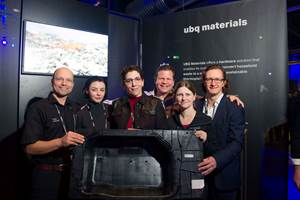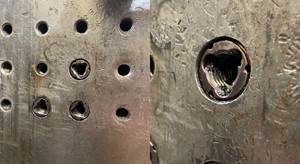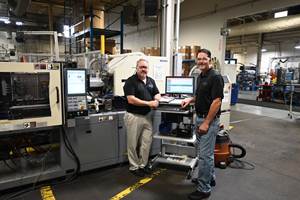Thermoset Molding Drives DMP’s Growth in Mexico
Processor Strategies
Dickten Masch using time-tested thermoset processing at Mexico plant to expand presence in automotive.
Right time. Right place. Right molder. Right process. These are the elements that have come together in the Monterrey, Mexico, plant of Dickten Masch Plastics (DMP), providing the Nashotah, Wis.-based injection molder with new opportunities to expand its presence in the recovering automotive market.
DMP got the 105,000 ft² plant in August 2011 as part of its acquisition of United Plastics Group. Since then, the molder’s business has jumped by roughly 40% in the Mexican market, due in large measure to rising demand for thermoset molded parts, which offer high durability, corrosion resistance, high precision, dielectric properties, and other key characteristics for automotive and other markets. DMP recently received ISO/TS 16949 automotive quality certification for its thermoplastic and thermoset operations in Monterrey.
“We made the decision to go to Mexico because we felt it was important to follow key anchor customers who themselves had moved to the area,” notes Kim Korth, DMP’s president and CEO. “And now, by transferring technology and expertise from our other locations, we’ve entered a class of suppliers who can offer certified thermoset and thermoplastic operations, which is especially hard to find in Mexico markets.”
DMP’s Monterrey facility may have the look of a thermoplastic molding plant. It houses 44 presses in tonnages ranging from 40 to 500. These machines perform a variety of thermoplastic processes such multi-shot molding, insert molding and overmolding, and elastomeric molding. But it’s thermoset molding—supported by a tradition at DMP that goes back to the 1950s—that is currently an area of investment for the venerable molder, which opened its doors in 1941.
“The seven thermoset presses already operational in Monterrey include compression, injection, and a hybrid known as injection-compression,” says Doreen Lettau, DMP’s v.p. of market and business development. Three more thermoset presses will be added this year, she adds, along with equipment for secondary operations such as deflashing, which result in a cleaner, more efficient operation.
DMP applies Scientific Molding principles to its thermoset molding process to maintain consistency and repeatability. It also uses dielectric cure sensing, a leading-edge technique that can monitor what’s happening to the material in the mold at all times. This maximizes precision, shortens cycle times, and allows DMP to get high-quality products to market faster than ever.
In automotive, the focus is on under-the-hood components exposed to fuel and high temperatures and pressures, or on parts that need dielectric properties and tight tolerances. These include cam gears, fuel pumps, structural brackets, and rocker covers. “We do a lot of precision parts for fuel pumps that are molded from thermosets,” states Lettau. “We’re able to lighten the parts and lower the cost. We’ve supplied these kinds of parts in North America for years.”
Adds Korth, “Our customers also turn to us for in-house engineering services, tooling, and a full complement of value-added manufacturing operations, including vendor-managed inventory, for a one-stop solution that improves their whole product.”
The company is also enhancing its technical staff to prepare for ongoing growth at the Monterrey facility. “We’re strengthening our talent base here in two ways: First, through bringing on additional talent; and second, through implementing internal and external training programs by partnering with organizations like RJG,” said Carl Lider, DMP’s v.p. of operations.
DMP is part of the Techniplas Group of companies, a privately held group of plastics-focused manufacturing businesses. Sister companies include Nyloncraft Inc. a 57-year-old technical-parts molder with facilities in Indiana and Michigan that focuses on the automotive and heavy trucking industries; and Vallotech, a Swiss high-technology precision molder of thermoplastic, thermoset, and metal insert parts for the automotive, electrical, and mechanical markets. Vallotech prides itself on very tight-tolerance molding down to ±1 micron.
Related Content
Honda Now Exploring UBQ’s Biobased Material Made from Unsorted Household Waste
UBQ is aiming to expand its reach for more sustainable automotive parts as well as non-automotive applications.
Read MoreMolder Repairs Platen Holes with Threaded Inserts
Automotive molder ITW Deltar Fasteners found new life for the battered bolt holes on its machine platens with a solution that’s designed to last.
Read MoreSPE Automotive Awards Applaud ‘Firsts’ and Emerging Technologies
The 51st annual SPE Automotive Innovation awards gave nods to several ‘firsts’ and added alternative vehicle systems category.
Read MoreAtop the Plastics Pyramid
Allegheny Performance Plastics specializes in molding parts from high-temperature resins for demanding applications as part of its mission to take on jobs ‘no one else does.’
Read MoreRead Next
People 4.0 – How to Get Buy-In from Your Staff for Industry 4.0 Systems
Implementing a production monitoring system as the foundation of a ‘smart factory’ is about integrating people with new technology as much as it is about integrating machines and computers. Here are tips from a company that has gone through the process.
Read MoreMaking the Circular Economy a Reality
Driven by brand owner demands and new worldwide legislation, the entire supply chain is working toward the shift to circularity, with some evidence the circular economy has already begun.
Read MoreFor PLASTICS' CEO Seaholm, NPE to Shine Light on Sustainability Successes
With advocacy, communication and sustainability as three main pillars, Seaholm leads a trade association to NPE that ‘is more active today than we have ever been.’
Read More






















